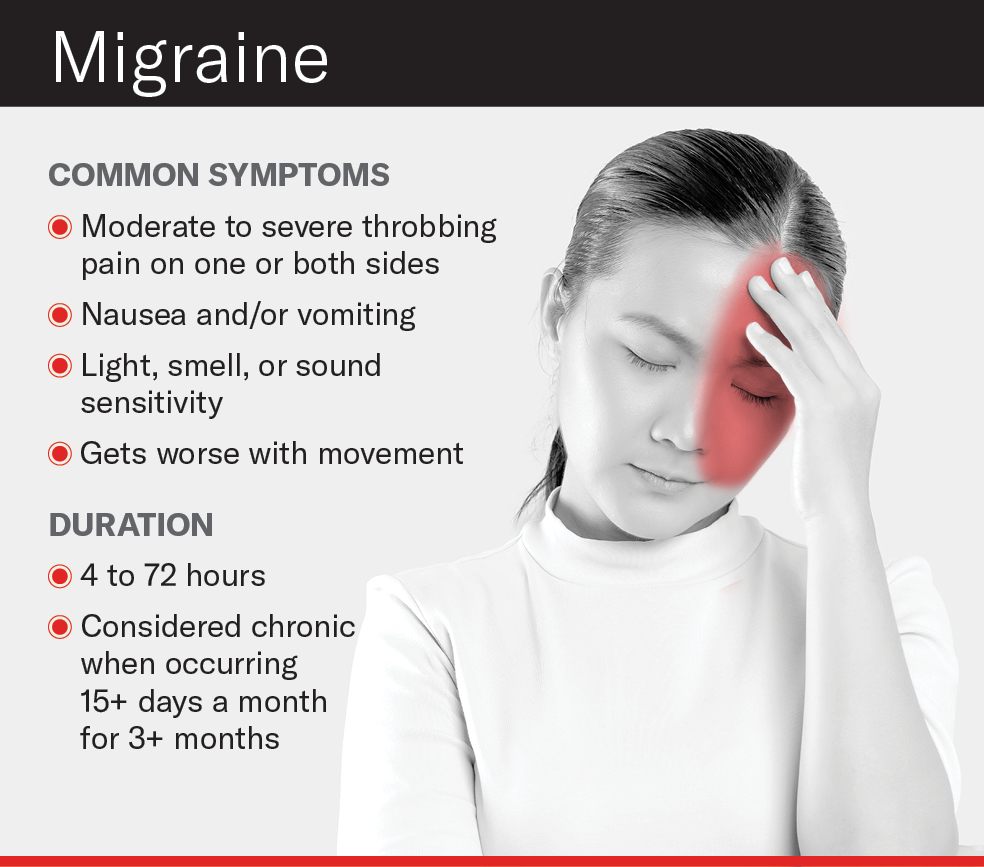
Migraine
Migraine is a medical problem. The majority of migraine sufferers sometimes experience very severe headaches. An intense throbbing pain on one or sometimes both sides of the head is the typical symptom of a migraine headache. Although any part of the head may be affected, the majority of migraine sufferers experience their pain in the temples behind one eye or in one ear.
Overview
Migraines are a type of vascular headache. Vasodilatation and enlargement of blood vessels that result in the release of chemicals from nerve fibers surrounding the major arteries in the brain are the causes of migraine headaches. It is a crippling illness marked by nausea and headaches that range from moderate to severe. A normal migraine is a pulsating headache. Although they can strike at any time of day, migraines usually begin in the morning.
The pain may subside after a few hours or for a day or two. A migraine may occur once or twice a week for certain people. For some, it's just once or twice annually. The majority of the time, migraines pose no threat to your general well-being. However, attacks can cause disruptions to your daily routine. Migraine not only hurts, but it can also make you sick, throw up, and become sensitive to light and sound. Some people may also experience a brief loss of vision spots or flashing lights.
Causes
It is believed that migraines are induced due to changes in some of your brain's chemicals. Many people have noticed that certain triggers cause migraines. Triggers can include the following:
Some foods and food additives include MSG (monosodium glutamate) nitrates and nitrites (found in hot dogs and other processed meats) artificial sweeteners (like NutraSweet) aged cheeses and chocolate. Food triggers vary from person to person.
Sleep disorders (inconsistent sleep patterns excessive or insufficient sleep)
Hormone changes in women are most commonly caused by birth control pills, having your period being pregnant, or being in menopause.
Dehydration is caused by insufficient water intake anxiety, stress, or other emotional issues.
Certain stimulants like perfumes, particular lights, or temperature changes can cause some people to experience migraines when their stress levels fluctuate, such as when they begin vacation or wrap up a demanding project at work.
Symptoms
A day or more in advance, you might feel ill. Auras are felt by certain people. Up to one hour before a migraine attack, this is a disruption of vision speech, or feeling.
You may notice zigzag lines blind spots, or flashing lights.
Some people have trouble speaking or experiencing ringing in their ears. The aura fades on its own.
A migraine typically begins with a sharp throbbing pain that is limited to one side of the head. As you move, it gets worse.
Both bright lights and loud noises could cause pain.
You could throw up or feel sick. This may continue for four hours or three days.
A migraine can cause so much pain that it makes it impossible to carry out daily tasks.
Following the headache, you may experience extreme fatigue nausea, or an abundance of energy. After vomiting or getting some rest, you might feel better.
Ayurvedic View
Ardhava bedaka- this disease affects head, here the word ardha means half part of head, avabedaka means splitting, bursting or breaking kind of pain. Due to all dosha involvement, mainly vata and anubandha (second predominant dosha either kapha, or pitta) after residing in one half of side of head causes migraine, where patient suffers from pain severe pain, if not treated can make individual blind or deaf. Ayurveda way of approach is to bring dosha back to prakruta awastha (balanced state), reduce the symptoms and reoccuring episodes by ayurvedic panchakarma treatment and local treatment for head, so as to nourish the nerves.
Ayurvedic Treatments
Shiroabhyanga Snehapana Bashpa Swedha Nadi swedam Vasti Virechana Nasya Vasti Dhoomapana Lepam Agnikarma Shirodhara Abhyangam Thalapodichil
Naturopathy Treatments
Enema Foot bath Hip bath Spinal spray Mud therapy Packs Compress Reflexology Acupuncture Manipulative therapy Diet therapy Clinical yoga Pranayama Mind sound resonance Cyclic meditation
Migraine
Treatment for
DISCLAIMER: Listed treatment details are only for information purposes. Treatments and duration may vary depending on numerous factors. Treatments for your condition may not be limited to this list.
